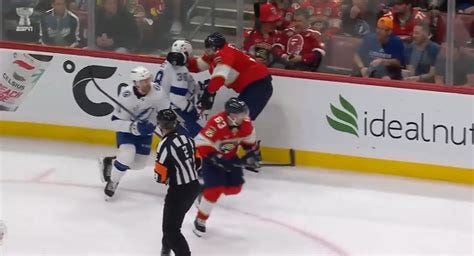The Self-Inflicted Irrelevance of the NHL DPS
Enforcers aren’t the bad guys on the ice anymore.
As I write and edit this, I’m watching my son at a baseball tournament. It’s amazing that I can get work like this done on a cell phone.
Now that the Capitals’ season is finished and my personal life is less hectic, I plan to get back to writing more and beginning to do some regular posting here. I’m also working on a site rebrand in effort to really push my writing, so please subscribe and tell your hockey friends to do so too!
We’re in the thick of another NHL playoff, and naturally that means fans are perpetually angry at referees. It wouldn’t be the playoffs if we didn’t have controversial non-calls and questionable decisions by the referees, but it is difficult for me to usually fault the refs for missing a call in the heat of the moment. The game is fast and furiously paced and as someone who tried tried their hand at reffing beer league games, I can attest to the difficulty of catching everything.
I can generally understand now anyway how the refs missed THAT call.
What I find less understandable, and often times inexplicable, is the missed calls by the NHL Department of Player Safety in the aftermath.
As I write this it is the day after yet another controversial play; this time by Darnell Nurse who took a slashing call on Roope Hintz. In the play, Hintz delivers a hit to the back of Nurse in front of the Oilers’ net, to which Nurse responds with a slash that clearly catches Hintz by the ankle. Hintz left the game, needing assistance to get off the ice and down the tunnel.
Below is the clip from the ESPN broadcast:
Unfortunately, this is a fairly innocuous play in many ways compared to some of the other offenses we’ve seen so far. There’s this hit on Leafs’ goalie Anthony Stolarz, which effectively ended his season. Then there’s this play on Brandon Hagel by Aaron Ekblad in the first round. And this ugly play by Andrei Svechnikov on Sergei Bobrovsky.
The Ekblad his earned him a 2 game suspension, and rightfully so. Hagel also earned his own suspension earlier in that series for a hit on Aleksander Barkov, so DPS clearly isn’t against the idea of handing out suspensions in the playoffs. But the lack of suspensions or even fines for hits like Bennett’s on Stolarz or Svechnikov on Bobrovsky are true head scratchers. Especially in the light of something comparably silly like shooting a puck at an opposing goalie during warmups.
Any hockey fan knows this isn’t a problem exclusive to the playoffs either, as we see plenty of similar issues during the regular season.
But perhaps the NHL’s glaring lack of consistency in enforcement is matched only by their inability to clearly communicate decisions to the fanbase. And all of these issues combine to create a notion that the Department of Player Safety is irrelevant. Most of this feeling is self-inflicted, too.
The reactions from these incidents are expected by all concerned, and would be no different if DPS handed out suspensions and fines more often.
But if you doubt their irrelevancy, look no further than the fact that these incidents continue to happen game after game. Season after season.
I’m not sure what the ultimate fix is and I also understand that hockey is fast and things are going to happen. But I cannot help but think that this would happen far less often if players knew their money was at stake when they choose to go barreling into the head of the opposing goaltender. Perhaps a player may actually think about the height of their stick before cross checking an opponent in the face if they knew it would cost them a greater amount of money.
I also don’t particularly want to hear the arguments about “soft” players and the tired old trope about hockey being a “contact sport.” I’ve been around the game long enough to know the difference between a good, clean hit that takes a player out of the play, and an ill-timed hit to a player’s head that risks their season, career, and livelihood.
The game has only gotten faster, and the players more skilled. Giant, brooding hitters and enforcers like Darius Kasparaitis and Marty McSorley are far less relevant in the modern game, and that’s perfectly fine.
But the arguments that enforcers police the ice to stop issues like we’re seeing are steeped in some truth. And if the traditional enforcer is no longer relevant in today’s NHL, the Department of Player Safety needs to pick up the slack and actually do their job: protect the players.





